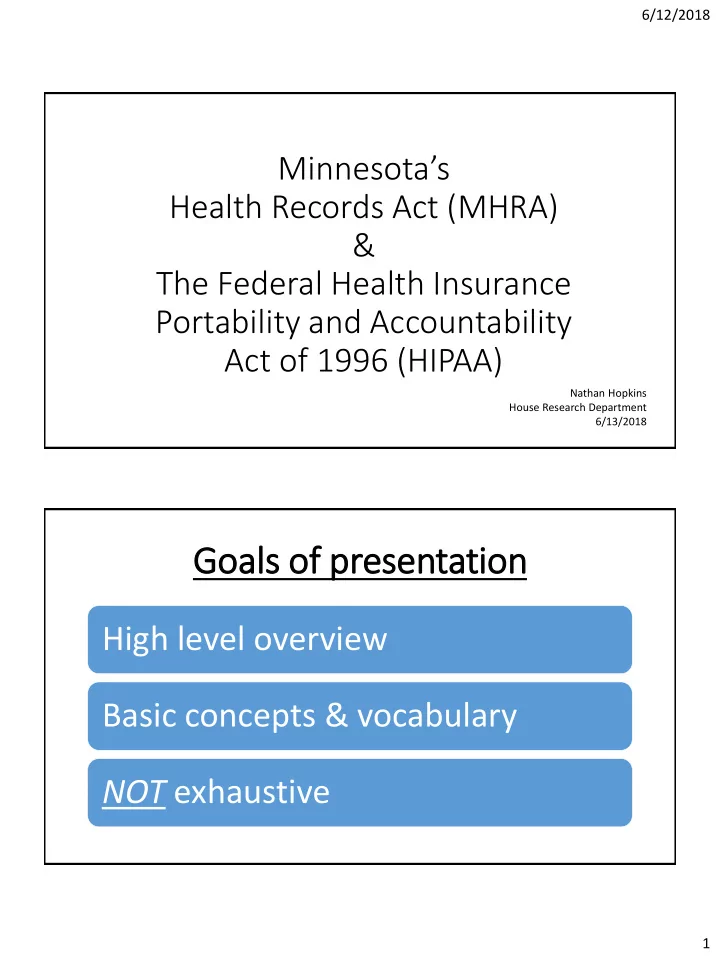

6/12/2018 Minnesota’s Health Records Act (MHRA) & The Federal Health Insurance Portability and Accountability Act of 1996 (HIPAA) Nathan Hopkins House Research Department 6/13/2018 Goal als of f presentation High level overview Basic concepts & vocabulary NOT exhaustive 1
6/12/2018 Statutory ry Back ckground HIPAA MHRA • Minnesota state law governing • Federal law governing, among access to and the release of patient other things, the use and health records disclosure of patient health • Minn. Stat. §§ 144.291 – 144.298 records • Current version passed in 2007 (Ch. • The Privacy Rule, 45 CFR Part 164, 147) subpart E • Preceded by § 144.335 • Passed in 1996 • Originally created in 1977 (Ch. 380); patient consent requirement for release of records to third parties added in 1991 (Ch. 319) – before HIPAA General Rule HIPAA MHRA • No release of patient health • No disclosure of protected records unless : health information (“PHI”) • patient consent or • except as permitted or required by HIPAA • specific authorization in (state) law — • Minimum necessary standard • does not include HIPAA • Disclose only as much PHI as necessary to perform a particular function The e exceptions to o th the gen eneral rul rule are key. HIP HIPAA exceptions are much more broad. 2
6/12/2018 Who must t comply ly? HIPAA MHRA • “Providers” and persons who • “Covered entities” receive health records from a • Health plans provider • Health care clearinghouses • Anyone who furnishes health care • Health care providers services • “Business associates” • Home care providers • Contract with covered entities to • Health care facilities perform activities that involve use or disclosure of PHI • Billing, practice management, data analysis, legal services MHRA Exceptio ions: When can dis isclo losure occur r with ithout consent? • In medical emergency • To other providers within related health care entities for treatment • If patient is deceased and release is for treatment of surviving adult child • To record locator services • Mental health records to law enforcement for emergencies • For external research, unless patient opts out 3
6/12/2018 HIP IPAA Exceptions: When can dis isclo losure occur r with ithout consent? • For treatment • For payment HIPAA does require • For health care operations “authorization” for: • Disclosure of psychotherapy • Public interest and benefit activities: notes for treatment, • Required by law payment, or health care • Public health activities operations; • Certain law enforcement purposes • Marketing purposes or sale • Serious threats to health or safety • Research • Internal fundraising Key takeaway: Because HIPAA allows disclosure without consent for treatment, payment, and healthcare operations , PHI can be shared more easily (subject to the minimum necessary requirement) 4
6/12/2018 How is is th the la law enforced? HIPAA MHRA • No private right of action • Disciplinary action by licensing • Complaint to HHS Office for Civil boards rights • Private right of action by patient • Civil penalties possible • Compensatory damages • Max. is $1.5M per violation category • Reasonable attorney fees per year • Criminal penalties prosecuted by DOJ • Up to 10 years in jail for stealing PHI • State Attorneys General authorized to bring civil actions on behalf of state residents HIP IPAA doe oes not ot preempt MHRA • The general statutory rule is that HIPAA supersedes or preempts any “contrary” provision of state law. 42 U.S.C. § 1320d – 7(a)(1). • A state law is “contrary” to HIPAA if a health care provider “would find it impossible to comply with both the State and federal requirements” or if the state law is “an obstacle to the accomplishment and execution of the full purposes” of HIPAA. 45 C.F.R. § 160.202 • Because MHRA is more restrictive , and HIPAA is more permissive , it is possible to comply with both 5
6/12/2018 Poli licy consid iderations Privacy Convenience / Efficiency Patient autonomy Care coordination / Health outcomes Administrative costs Poli licy consid iderations What do patients want? • Expectations matter • Privacy / autonomy vs. convenience / efficiency What do providers want? What produces the best health outcomes? • At the individual level • At the population level What reduces red tape and administrative costs? What encourages innovation in health care delivery? 6
Recommend
More recommend